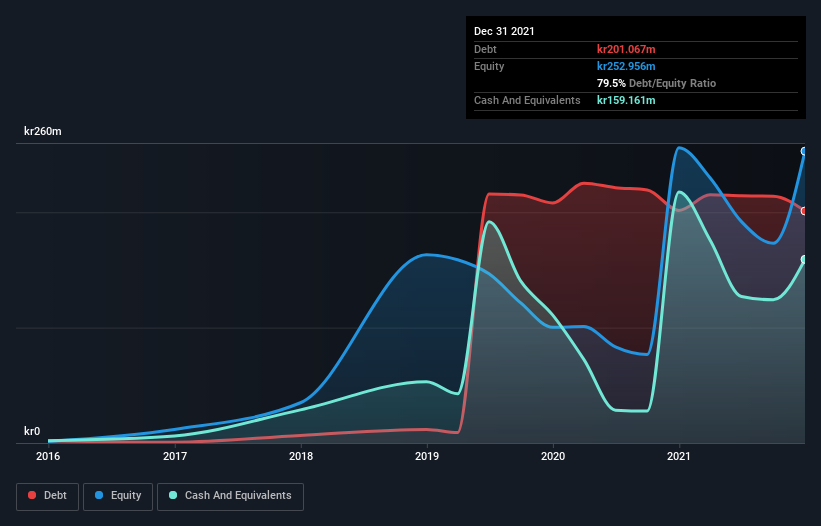Warren Buffett famously said, 'Volatility is far from synonymous with risk.' So it might be obvious that you need to consider debt, when you think about how risky any given stock is, because too much debt can sink a company. We note that Midsummer AB (publ) (STO:MIDS) does have debt on its balance sheet. But should shareholders be worried about its use of debt?
Why Does Debt Bring Risk?
Debt is a tool to help businesses grow, but if a business is incapable of paying off its lenders, then it exists at their mercy. Part and parcel of capitalism is the process of 'creative destruction' where failed businesses are mercilessly liquidated by their bankers. While that is not too common, we often do see indebted companies permanently diluting shareholders because lenders force them to raise capital at a distressed price. Having said that, the most common situation is where a company manages its debt reasonably well - and to its own advantage. The first thing to do when considering how much debt a business uses is to look at its cash and debt together.
See our latest analysis for Midsummer
What Is Midsummer's Net Debt?
The chart below, which you can click on for greater detail, shows that Midsummer had kr201.1m in debt in December 2021; about the same as the year before. However, it also had kr159.2m in cash, and so its net debt is kr41.9m.

How Strong Is Midsummer's Balance Sheet?
According to the last reported balance sheet, Midsummer had liabilities of kr33.5m due within 12 months, and liabilities of kr204.8m due beyond 12 months. Offsetting these obligations, it had cash of kr159.2m as well as receivables valued at kr92.5m due within 12 months. So it can boast kr13.4m more liquid assets than total liabilities.
Having regard to Midsummer's size, it seems that its liquid assets are well balanced with its total liabilities. So it's very unlikely that the kr673.3m company is short on cash, but still worth keeping an eye on the balance sheet. When analysing debt levels, the balance sheet is the obvious place to start. But it is future earnings, more than anything, that will determine Midsummer's ability to maintain a healthy balance sheet going forward. So if you want to see what the professionals think, you might find this free report on analyst profit forecasts to be interesting.
Over 12 months, Midsummer reported revenue of kr119m, which is a gain of 25%, although it did not report any earnings before interest and tax. With any luck the company will be able to grow its way to profitability.
Caveat Emptor
While we can certainly appreciate Midsummer's revenue growth, its earnings before interest and tax (EBIT) loss is not ideal. Its EBIT loss was a whopping kr119m. On a more positive note, the company does have liquid assets, so it has a bit of time to improve its operations before the debt becomes an acute problem. Still, we'd be more encouraged to study the business in depth if it already had some free cash flow. So it seems too risky for our taste. When analysing debt levels, the balance sheet is the obvious place to start. However, not all investment risk resides within the balance sheet - far from it. Be aware that Midsummer is showing 5 warning signs in our investment analysis , and 1 of those is concerning...
When all is said and done, sometimes its easier to focus on companies that don't even need debt. Readers can access a list of growth stocks with zero net debt 100% free, right now.
New: Manage All Your Stock Portfolios in One Place
We've created the ultimate portfolio companion for stock investors, and it's free.
• Connect an unlimited number of Portfolios and see your total in one currency
• Be alerted to new Warning Signs or Risks via email or mobile
• Track the Fair Value of your stocks
Have feedback on this article? Concerned about the content? Get in touch with us directly. Alternatively, email editorial-team (at) simplywallst.com.
This article by Simply Wall St is general in nature. We provide commentary based on historical data and analyst forecasts only using an unbiased methodology and our articles are not intended to be financial advice. It does not constitute a recommendation to buy or sell any stock, and does not take account of your objectives, or your financial situation. We aim to bring you long-term focused analysis driven by fundamental data. Note that our analysis may not factor in the latest price-sensitive company announcements or qualitative material. Simply Wall St has no position in any stocks mentioned.
About OM:MIDS
Midsummer
Develops, manufactures, and sells solar panels to industrial and commercial properties, public sector organizations, private individuals, and roof and solar cell installers.
Moderate risk with mediocre balance sheet.
Market Insights
Community Narratives



